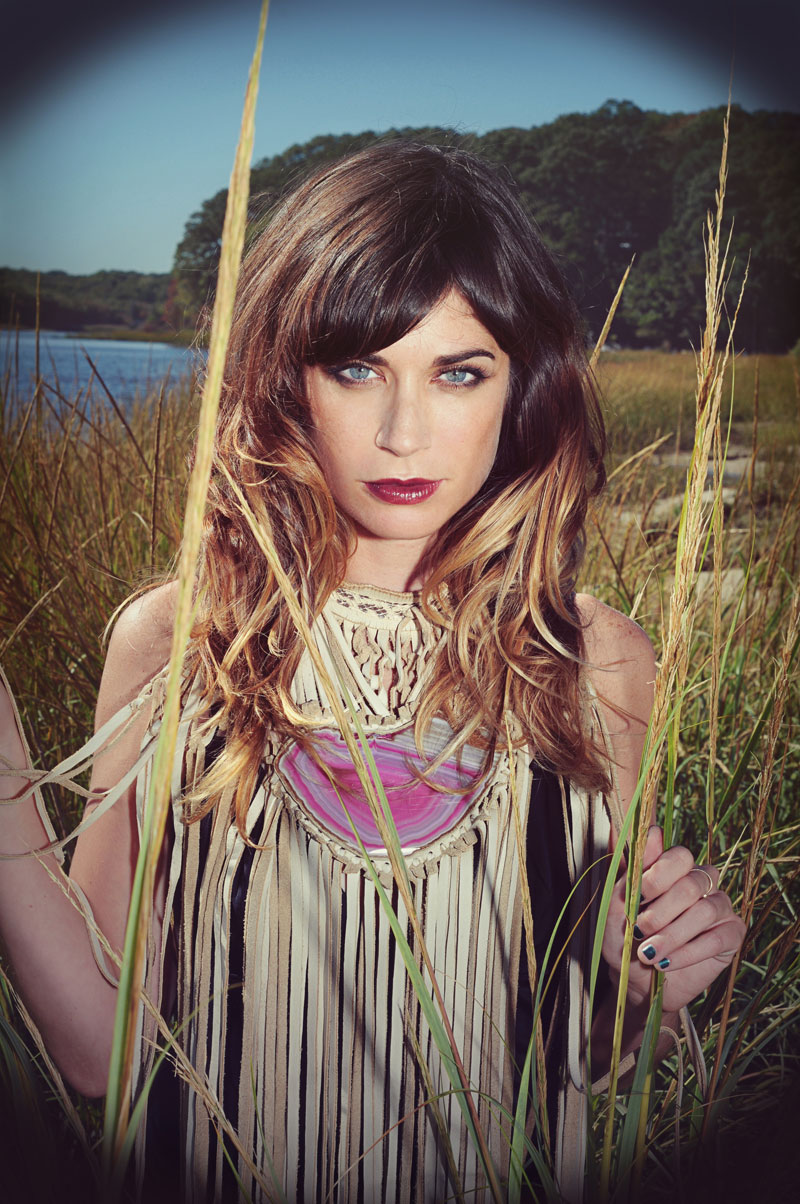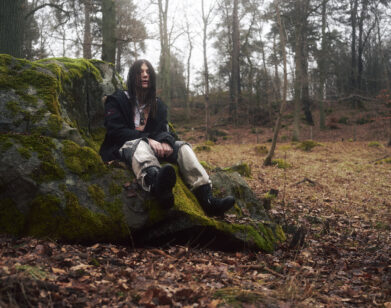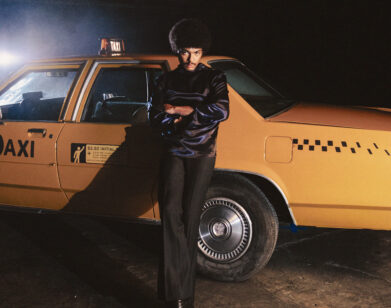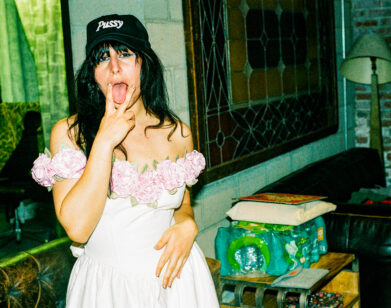Love Lost’s Labor: Nicole Atkins on Mondo Amore

NICOLE ATKINS. PHOTO COURTESY OF LUCIA HOLM
In Nicole Atkins’ song “Hotel Plaster,” off her new album Mondo Amore, she unironically uses the word “boudoir.”
“I’m really melodramatic,” she says. And on this album, Atkins has had good reason to be that way. A lot has changed since her debut album, Neptune City, released in 2007. She lost her record label, her boyfriend, and her band, and moved back to New York from Asbury Park, New Jersey. She re-emerged with an album that’s rougher and more intimate than her output before. On the opening song of her debut album, Neptune City, Atkins sang of promise, with her characteristic brassy power: “I know we’ll meet again/ maybe tonight/ just tell me where and when.” On Mondo Amore‘s first track, “vultures circle in/ heavy like a stone/ they take all they can get/ until you’re dirt and bones.” And that’s just the beginning.
We talked to Atkins from her “boudoir” in Brooklyn as she waited for the snow to start falling last week; about the emotional process of writing her album, her sea imagery, and how being an illustrator is like to being a songwriter.
ESTHER ZUCKERMAN: Neptune City was heavily influenced by your childhood. Does this album have the same kind of singular driving force behind it?
NICOLE ATKINS: No. Neptune City was more of a landscape record. It was more reminiscing about my hometown and growing up there, the actual place. It was more of a place album, and Mondo Amore is more of an emotional record, it’s more of a love lost record.
ZUCKERMAN: Your website explains that this album was born out of a rocky time in your life. Can you talk about that and how it influenced the album?
ATKINS: It was three breakups going on at the same time. It was breaking up with my band, and my boyfriend, and right after that, my record label. I was arguing a lot with my record label during that whole time, so maybe they all affected each other. This record came out of a time that was really heartbreaking and confusing, and that’s why I switched the sound up a lot, to make it sound a little bit grittier and more raw. I stripped down a lot of the orchestrations that I had originally in Neptune City, because I wanted to convey that sense of emotional rawness and grit. I was writing the record while that was happening, and then after it did, I moved back in with my mom for a month and cried for like a week. And then I just called up all of my old friends in New York and in Brooklyn and they were like, “Move back here and let’s get started on your record.”
ZUCKERMAN: You were writing the record while this was all happening. Did you write any of the songs to get out of that confusion and heartbreak or was that happening alongside? Was there a purposeful process behind writing them?
ATKINS: When you are going through something that heavy, for me anyway, I couldn’t imagine writing about anything else. I always tend to write about what’s most prevalent in my mind. Those situations were just taking over my entire life. It was fun to write in a way, because it helped me take a really bad situation and a really sad situation and make beautiful songs out of them. When I got half of the song written it was like, “Oh, this is great.” It was like the one thing that was making me happy again. A lot of love records or breakup records, a lot of the songs can tend to be on the blame side and the bitter side. And this was good for me, writing, because it made me feel like I was forcing myself to be more mature and grow up a little bit. It’s not putting the blame on anybody, it’s accepting responsibility just as much as the other person.
ZUCKERMAN: Your band name, in both incarnations, includes the words “The Sea.” In the song “Vultures” you even say, “hide behind the sea.” Why that theme? Why does the sea keep popping up?
ATKINS: You’re the first person to mention that. That was pretty purposeful. I always wanted, since I was young, to have a band called The Sea. I changed it just slightly to The Black Sea. The original members of The Sea, even though we parted ways, we’re all still friends, and I wanted to keep the name The Sea but also honor the past band members.
The sound is a lot different. It’s a lot darker and heavier so I thought, you know, The Black Sea fit. The song “Vultures” is about fear, and it’s about working your whole life for something—whether it be a job or a relationship—and then learning that sometimes it might not work out the way you want it to.
ZUCKERMAN: Neptune City, because it is so rooted in place, felt very East Coast to me. But there are parts of Mondo Amore that have a more country, twangier feel. You went to school in North Carolina. Did that have anything to do with the change?
ATKINS: Even with Neptune City, I feel like if you strip down all the arrangements, I feel like each of my songs is always going to be, at its core, either a country song or a blues song. I went to college in North Carolina, and that’s how I learned how to play music. I learned how to play guitar when I was 12, and I was always in bands, but the first time I ever started writing my own music was being surrounded by a lot of songwriter friends in North Carolina.
This record, I just wanted to get it more to the roots of the music that I really loved, and that’s blues, country and psychedelic rock. Classic rock in kind of a more J.J. Cale way, mixed with like Derek and the Dominos or Pink Floyd. The visual I had in my head for it was a girl wearing a really glammed-out Ole Opry dress in the alley of a New York bar, smoking a cigarette.
ZUCKERMAN: You went to college to become an illustrator—how has your work as a visual artist influenced your music?
ATKINS: I always have a hard time answering that question. They are both things that I do all the time—I don’t really think about it. The one thing I’ve been noticing recently was that I started drawing a lot again lately—something I haven’t really done seriously in years—and it’s weird. The subject matter that I wrote the record about, it’s been so long now that I’m looking at it as a spectator, or listening to it as a spectator, just like any stranger would hear it. So I’m happy again. So I’m making lots of art and writing lots of songs again.
ZUCKERMAN: Mondo Amore feels more personal than Neptune City. Was that something you were going for with this album?
ATKINS: I think they sound a lot more personal because they are. With Neptune City, I could have been singing about anybody’s life that grew up where I did. The town I live in it isn’t that magical, but when you’re growing up, you think that everything is so important. It was trying to make my little town seem as magical as I could. With Neptune City, I put my writing at more of an arm’s length for a listener, just because it felt safer. With this new one, I couldn’t do that anymore. I’m kind of nervous for people back home to hear it, even my parents, like, “Are you okay?” And I am okay now, but at the time I wasn’t. So it’s more like, you know, fuck it, I’ll be as personal as I want right now.
NICOLE ATKINS’ MONDO AMORE IS OUT TOMORROW ON RAZOR & TIE MUSIC. SHE WILL PLAY BOWERY BALLROOM ON WEDNESDAY, FEBRUARY 9, AND WILL CONTINUE TO TOUR THROUGH FEBRUARY AND MARCH. FOR MORE INFORMATION, VISIT ATKINS’ WEBSITE.






